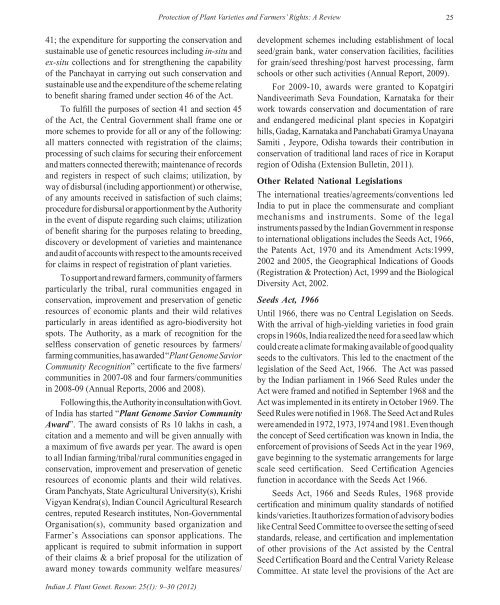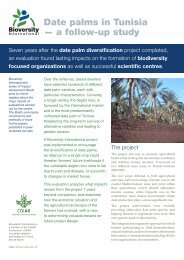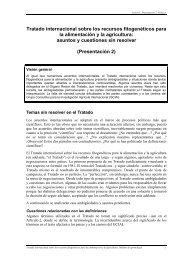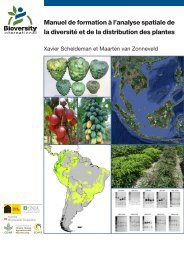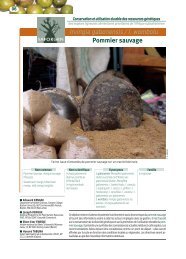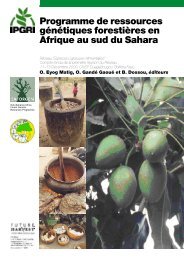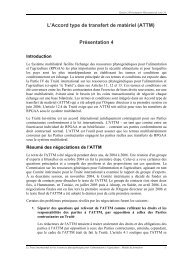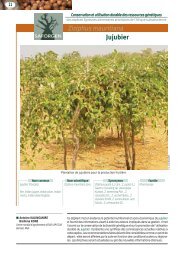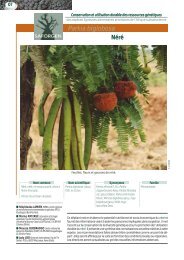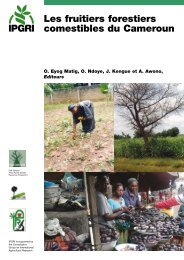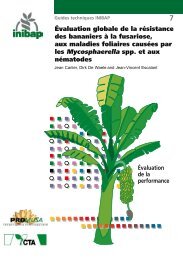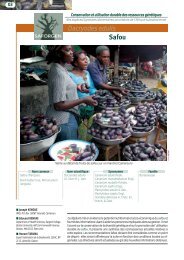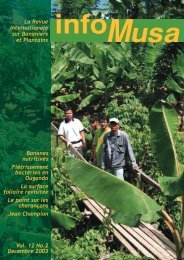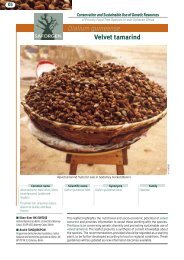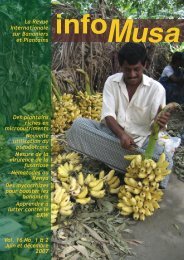indian society of plant genetic resources - Bioversity International
indian society of plant genetic resources - Bioversity International
indian society of plant genetic resources - Bioversity International
You also want an ePaper? Increase the reach of your titles
YUMPU automatically turns print PDFs into web optimized ePapers that Google loves.
41; the expenditure for supporting the conservation and<br />
sustainable use <strong>of</strong> <strong>genetic</strong> <strong>resources</strong> including in-situ and<br />
ex-situ collections and for strengthening the capability<br />
<strong>of</strong> the Panchayat in carrying out such conservation and<br />
sustainable use and the expenditure <strong>of</strong> the scheme relating<br />
to benefi t sharing framed under section 46 <strong>of</strong> the Act.<br />
To fulfi ll the purposes <strong>of</strong> section 41 and section 45<br />
<strong>of</strong> the Act, the Central Government shall frame one or<br />
more schemes to provide for all or any <strong>of</strong> the following:<br />
all matters connected with registration <strong>of</strong> the claims;<br />
processing <strong>of</strong> such claims for securing their enforcement<br />
and matters connected therewith; maintenance <strong>of</strong> records<br />
and registers in respect <strong>of</strong> such claims; utilization, by<br />
way <strong>of</strong> disbursal (including apportionment) or otherwise,<br />
<strong>of</strong> any amounts received in satisfaction <strong>of</strong> such claims;<br />
procedure for disbursal or apportionment by the Authority<br />
in the event <strong>of</strong> dispute regarding such claims; utilization<br />
<strong>of</strong> benefi t sharing for the purposes relating to breeding,<br />
discovery or development <strong>of</strong> varieties and maintenance<br />
and audit <strong>of</strong> accounts with respect to the amounts received<br />
for claims in respect <strong>of</strong> registration <strong>of</strong> <strong>plant</strong> varieties.<br />
To support and reward farmers, community <strong>of</strong> farmers<br />
particularly the tribal, rural communities engaged in<br />
conservation, improvement and preservation <strong>of</strong> <strong>genetic</strong><br />
<strong>resources</strong> <strong>of</strong> economic <strong>plant</strong>s and their wild relatives<br />
particularly in areas identifi ed as agro-biodiversity hot<br />
spots. The Authority, as a mark <strong>of</strong> recognition for the<br />
selfl ess conservation <strong>of</strong> <strong>genetic</strong> <strong>resources</strong> by farmers/<br />
farming communities, has awarded “Plant Genome Savior<br />
Community Recognition” certifi cate to the fi ve farmers/<br />
communities in 2007-08 and four farmers/communities<br />
in 2008-09 (Annual Reports, 2006 and 2008).<br />
Following this, the Authority in consultation with Govt.<br />
<strong>of</strong> India has started “Plant Genome Savior Community<br />
Award”. The award consists <strong>of</strong> Rs 10 lakhs in cash, a<br />
citation and a memento and will be given annually with<br />
a maximum <strong>of</strong> fi ve awards per year. The award is open<br />
to all Indian farming/tribal/rural communities engaged in<br />
conservation, improvement and preservation <strong>of</strong> <strong>genetic</strong><br />
<strong>resources</strong> <strong>of</strong> economic <strong>plant</strong>s and their wild relatives.<br />
Gram Panchyats, State Agricultural University(s), Krishi<br />
Vigyan Kendra(s), Indian Council Agricultural Research<br />
centres, reputed Research institutes, Non-Governmental<br />
Organisation(s), community based organization and<br />
Farmer’s Associations can sponsor applications. The<br />
applicant is required to submit information in support<br />
<strong>of</strong> their claims & a brief proposal for the utilization <strong>of</strong><br />
award money towards community welfare measures/<br />
Indian J. Plant Genet. Resour. 25(1): 9–30 (2012)<br />
Protection <strong>of</strong> Plant Varieties and Farmers’ Rights: A Review 25<br />
development schemes including establishment <strong>of</strong> local<br />
seed/grain bank, water conservation facilities, facilities<br />
for grain/seed threshing/post harvest processing, farm<br />
schools or other such activities (Annual Report, 2009).<br />
For 2009-10, awards were granted to Kopatgiri<br />
Nandiveerimath Seva Foundation, Karnataka for their<br />
work towards conservation and documentation <strong>of</strong> rare<br />
and endangered medicinal <strong>plant</strong> species in Kopatgiri<br />
hills, Gadag, Karnataka and Panchabati Gramya Unayana<br />
Samiti , Jeypore, Odisha towards their contribution in<br />
conservation <strong>of</strong> traditional land races <strong>of</strong> rice in Koraput<br />
region <strong>of</strong> Odisha (Extension Bulletin, 2011).<br />
Other Related National Legislations<br />
The international treaties/agreements/conventions led<br />
India to put in place the commensurate and compliant<br />
mechanisms and instruments. Some <strong>of</strong> the legal<br />
instruments passed by the Indian Government in response<br />
to international obligations includes the Seeds Act, 1966,<br />
the Patents Act, 1970 and its Amendment Acts:1999,<br />
2002 and 2005, the Geographical Indications <strong>of</strong> Goods<br />
(Registration & Protection) Act, 1999 and the Biological<br />
Diversity Act, 2002.<br />
Seeds Act, 1966<br />
Until 1966, there was no Central Legislation on Seeds.<br />
With the arrival <strong>of</strong> high-yielding varieties in food grain<br />
crops in 1960s, India realized the need for a seed law which<br />
could create a climate for making available <strong>of</strong> good quality<br />
seeds to the cultivators. This led to the enactment <strong>of</strong> the<br />
legislation <strong>of</strong> the Seed Act, 1966. The Act was passed<br />
by the Indian parliament in 1966 Seed Rules under the<br />
Act were framed and notifi ed in September 1968 and the<br />
Act was implemented in its entirety in October 1969. The<br />
Seed Rules were notifi ed in 1968. The Seed Act and Rules<br />
were amended in 1972, 1973, 1974 and 1981. Even though<br />
the concept <strong>of</strong> Seed certifi cation was known in India, the<br />
enforcement <strong>of</strong> provisions <strong>of</strong> Seeds Act in the year 1969,<br />
gave beginning to the systematic arrangements for large<br />
scale seed certifi cation. Seed Certifi cation Agencies<br />
function in accordance with the Seeds Act 1966.<br />
Seeds Act, 1966 and Seeds Rules, 1968 provide<br />
certifi cation and minimum quality standards <strong>of</strong> notifi ed<br />
kinds/varieties. It authorizes formation <strong>of</strong> advisory bodies<br />
like Central Seed Committee to oversee the setting <strong>of</strong> seed<br />
standards, release, and certifi cation and implementation<br />
<strong>of</strong> other provisions <strong>of</strong> the Act assisted by the Central<br />
Seed Certifi cation Board and the Central Variety Release<br />
Committee. At state level the provisions <strong>of</strong> the Act are


